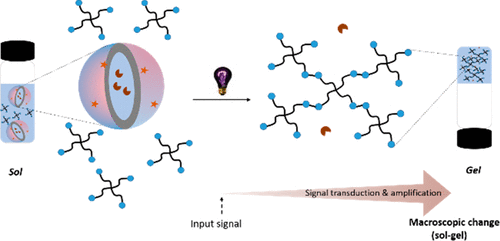当前位置:
X-MOL 学术
›
ACS Macro Lett.
›
论文详情
Our official English website, www.x-mol.net, welcomes your
feedback! (Note: you will need to create a separate account there.)
Construction from Destruction: Hydrogel Formation from Triggered Depolymerization-Based Release of an Enzymatic Catalyst
ACS Macro Letters ( IF 5.1 ) Pub Date : 2020-02-25 , DOI: 10.1021/acsmacrolett.0c00023 Vikash Kumar , Justin T Harris 1 , Alexander Ribbe , Marina Franc , Youngju Bae , Anne J McNeil 1 , S Thayumanavan
ACS Macro Letters ( IF 5.1 ) Pub Date : 2020-02-25 , DOI: 10.1021/acsmacrolett.0c00023 Vikash Kumar , Justin T Harris 1 , Alexander Ribbe , Marina Franc , Youngju Bae , Anne J McNeil 1 , S Thayumanavan
Affiliation

|
Biomimetic systems that undergo macroscopic phase transformations by transducing and amplifying external cues are highly desirable for applications such as self-healing. Here, we report self-assembly of polyelectrolyte complexes into a vesicular structure that can accommodate hydrophilic guest molecules, including enzymes. Triggered depolymerization of one of the polyelectrolyte molecules in the complex causes the vesicle to disassemble and release its contents. Such a triggered release of enzymes causes molecular-scale events to be amplified due to the enzyme’s catalytic properties. This feature has been utilized to demonstrate construction of hydrogels from the destruction of nanoscopic polymeric vesicles. The design principles developed here are broadly adaptable to other triggerable depolymerization motifs reported in the literature.
中文翻译:

从破坏中构建:由基于解聚的酶催化剂的触发释放形成水凝胶
通过转换和放大外部线索进行宏观相变的仿生系统对于自我修复等应用来说是非常理想的。在这里,我们报告了聚电解质复合物自组装成可容纳亲水性客体分子(包括酶)的囊状结构。复合物中一种聚电解质分子的触发解聚导致囊泡分解并释放其内容物。由于酶的催化特性,酶的这种触发释放导致分子级事件被放大。该特征已被用于证明从纳米级聚合物囊泡的破坏中构建水凝胶。这里开发的设计原则广泛适用于文献中报道的其他可触发解聚基序。
更新日期:2020-02-25
中文翻译:

从破坏中构建:由基于解聚的酶催化剂的触发释放形成水凝胶
通过转换和放大外部线索进行宏观相变的仿生系统对于自我修复等应用来说是非常理想的。在这里,我们报告了聚电解质复合物自组装成可容纳亲水性客体分子(包括酶)的囊状结构。复合物中一种聚电解质分子的触发解聚导致囊泡分解并释放其内容物。由于酶的催化特性,酶的这种触发释放导致分子级事件被放大。该特征已被用于证明从纳米级聚合物囊泡的破坏中构建水凝胶。这里开发的设计原则广泛适用于文献中报道的其他可触发解聚基序。











































 京公网安备 11010802027423号
京公网安备 11010802027423号